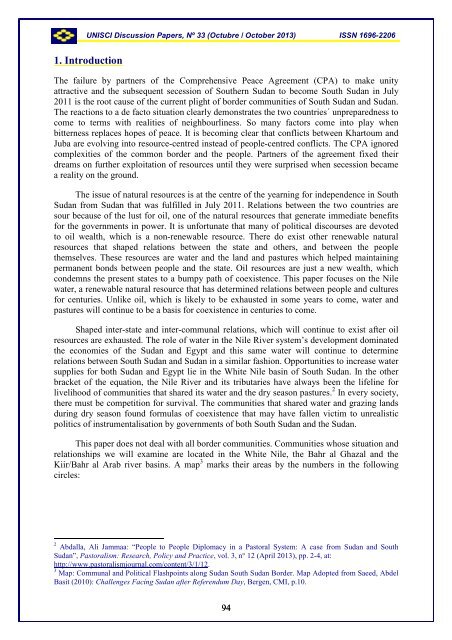UNISCI - Universidad Complutense de Madrid
UNISCI - Universidad Complutense de Madrid
UNISCI - Universidad Complutense de Madrid
You also want an ePaper? Increase the reach of your titles
YUMPU automatically turns print PDFs into web optimized ePapers that Google loves.
<strong>UNISCI</strong> Discussion Papers, Nº 33 (Octubre / October 2013) ISSN 1696-22061. IntroductionThe failure by partners of the Comprehensive Peace Agreement (CPA) to make unityattractive and the subsequent secession of Southern Sudan to become South Sudan in July2011 is the root cause of the current plight of bor<strong>de</strong>r communities of South Sudan and Sudan.The reactions to a <strong>de</strong> facto situation clearly <strong>de</strong>monstrates the two countries´ unpreparedness tocome to terms with realities of neighbourliness. So many factors come into play whenbitterness replaces hopes of peace. It is becoming clear that conflicts between Khartoum andJuba are evolving into resource-centred instead of people-centred conflicts. The CPA ignoredcomplexities of the common bor<strong>de</strong>r and the people. Partners of the agreement fixed theirdreams on further exploitation of resources until they were surprised when secession becamea reality on the ground.The issue of natural resources is at the centre of the yearning for in<strong>de</strong>pen<strong>de</strong>nce in SouthSudan from Sudan that was fulfilled in July 2011. Relations between the two countries aresour because of the lust for oil, one of the natural resources that generate immediate benefitsfor the governments in power. It is unfortunate that many of political discourses are <strong>de</strong>votedto oil wealth, which is a non-renewable resource. There do exist other renewable naturalresources that shaped relations between the state and others, and between the peoplethemselves. These resources are water and the land and pastures which helped maintainingpermanent bonds between people and the state. Oil resources are just a new wealth, whichcon<strong>de</strong>mns the present states to a bumpy path of coexistence. This paper focuses on the Nilewater, a renewable natural resource that has <strong>de</strong>termined relations between people and culturesfor centuries. Unlike oil, which is likely to be exhausted in some years to come, water andpastures will continue to be a basis for coexistence in centuries to come.Shaped inter-state and inter-communal relations, which will continue to exist after oilresources are exhausted. The role of water in the Nile River system’s <strong>de</strong>velopment dominatedthe economies of the Sudan and Egypt and this same water will continue to <strong>de</strong>terminerelations between South Sudan and Sudan in a similar fashion. Opportunities to increase watersupplies for both Sudan and Egypt lie in the White Nile basin of South Sudan. In the otherbracket of the equation, the Nile River and its tributaries have always been the lifeline forlivelihood of communities that shared its water and the dry season pastures. 2 In every society,there must be competition for survival. The communities that shared water and grazing landsduring dry season found formulas of coexistence that may have fallen victim to unrealisticpolitics of instrumentalisation by governments of both South Sudan and the Sudan.This paper does not <strong>de</strong>al with all bor<strong>de</strong>r communities. Communities whose situation andrelationships we will examine are located in the White Nile, the Bahr al Ghazal and theKiir/Bahr al Arab river basins. A map 3 marks their areas by the numbers in the followingcircles:2 Abdalla, Ali Jammaa: “People to People Diplomacy in a Pastoral System: A case from Sudan and SouthSudan”, Pastoralism: Research, Policy and Practice, vol. 3, n° 12 (April 2013), pp. 2-4, at:http://www.pastoralismjournal.com/content/3/1/12.3 Map: Communal and Political Flashpoints along Sudan South Sudan Bor<strong>de</strong>r. Map Adopted from Saeed, Ab<strong>de</strong>lBasit (2010): Challenges Facing Sudan after Referendum Day, Bergen, CMI, p.10.94
















